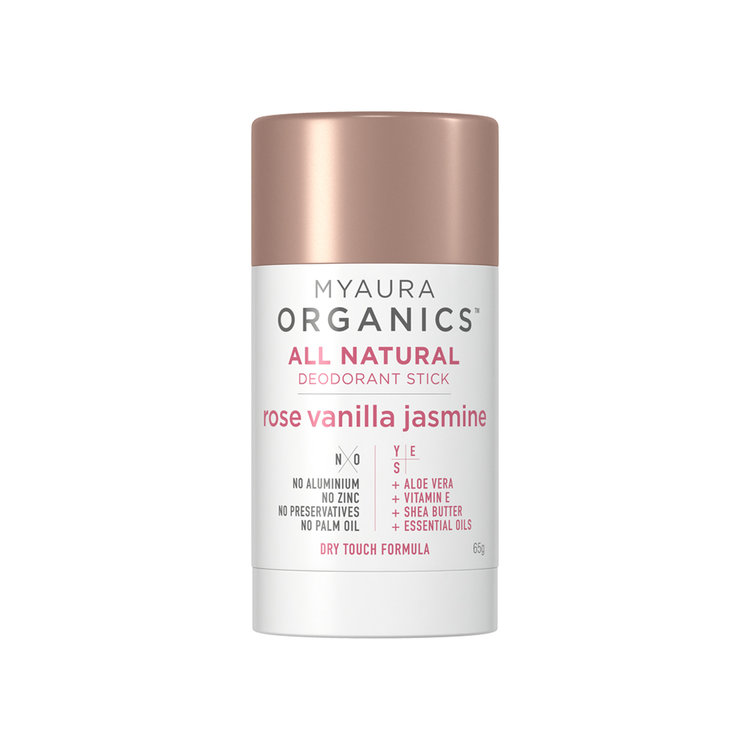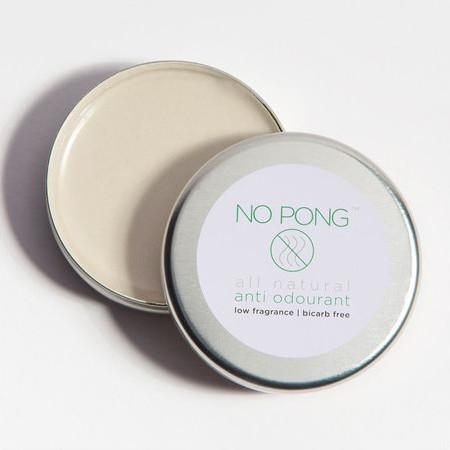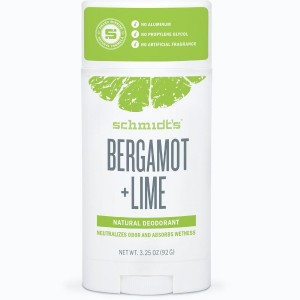
Everything you need to
know about natural deodorant
If you've thought about making the switch to natural deodorant, here's everything you need to know before taking the plunge.

I've worn the same deodorant since puberty. Somehow, I found 'my brand' and stuck to it, remaining sceptical that anything less than this sports-strength antiperspirant would stop me smelling like a wet shoe.
I first agreed to give natural deodorant a go after I'd heard a rumour that antiperspirants could lead to Alzheimer's (Note: this is not true, but more on that later). However, I ended up sticking with it because I liked that it was cruelty-free, used plant-based ingredients and, ultimately, made me smell even more delicious than my powdery antiperspirant. Not everyone loves it as much as I do though. There are some cons to consider...
Natural deodorant: general pros and cons
Pro: No animal testing
For me, the absolute best reason to give natural deodorants a go is that most brands are cruelty-free, which means they don't test on animals. As a consumer that increasingly opts for vegan and cruelty-free skincare and cosmetics, I was amazed I'd never thought about my deodorant. If you're unsure if your regular deodorant brand tests on animals, PETA has a handy cruelty-free cosmetics index.
Pro & con: They won't stop you sweating
While antiperspirants contain aluminium, the ingredient that stops you sweating, natural deodorants still allow you to sweat but aim to neutralise your body odour. For most people, this is actually a good thing as it reassures them their toxins are leaving their body. While I can confirm it takes some getting used to, after a while I found my sweat just didn't smell terrible (in fact, it smells mostly like vanilla - win!).
On the downside, this does mean that most natural deodorants fall short when it comes to exercise. I spoke to a number of women and many still weren't happy with their natural deodorant after a workout. However, I did find a personal trainer dedicated to the natural stuff, and she recommends No Pong brand. (You can read the pros and cons below.)
Con: some varieties can cause irritation
The other issue people tend to have with natural deodorants is that most products contain bi-carb soda, which can irritate the skin. If you have sensitive skin but still want to try it out, make sure you start with a bi-carb free option.
After reaching out to a community of women who loved their natural deodorants, I found a few worthy of your time if you want to give them a go:
Product reviews:
MyAura Organics, $9
Pros: It smells delicious (I use the rose, vanilla and jasmine scent) and it masks odour better than my clinical deodorant. It's also cruelty-free, palm oil-free and vegan. The ingredients are all natural and I was told I could even eat it if I wanted to. That's a pro, right?
Cons: Like a lot of natural deodorants, the consistency is quite cakey. While it's easy to apply, it may clump a bit. Not the best look with sleeveless tops!

No Pong Deodorant, Bi-Carb Free, $9.95
Pros: This one is perfect for sensitive skin as it doesn't contain bi-carb - a common irritant in natural deodorants. As mentioned above, personal trainer Lizzy Williamson, recommended No Pong (not the bi-carb-free version) as the only brand that protected her from stinking during a workout session.
Cons: After prolonged daily use, Amy from The Low Tox Fox organic store found that she became a bit resistant, so she alternates between No Pong Bi-Carb Free and Black Chicken Axilla Barrier Booster. A paste can also be a bit harder to apply than a stick deodorant.
No Pong Deodorant, Bi-Carb Free, $9.95
Pros: This one is perfect for sensitive skin as it doesn't contain bi-carb - a common irritant in natural deodorants. As mentioned above, personal trainer Lizzy Williamson, recommended No Pong (not the bi-carb-free version) as the only brand that protected her from stinking during a workout session.
Cons: After prolonged daily use, Amy from The Low Tox Fox organic store found that she became a bit resistant, so she alternates between No Pong Bi-Carb Free and Black Chicken Axilla Barrier Booster. A paste can also be a bit harder to apply than a stick deodorant.

Aesop Deodorant, $35
Pros: The clear liquid formula means it won't clump or mark your clothes, natural deodorant devotee Jessa said. She also described it as smelling 'elegant'.
Cons: Not only is it one of the more expensive products on the market, it's doesn't offer much protection for people who sweat a lot, or even a little bit.
Schmidt's Deodorant Stick, $19.95
Pros: Health, fitness and food coaches, Clint and Amy, both recommend this product which they claim keeps them dry. There's also a good range of scents available.
Cons: Schmidt's does flake a bit due to the consistency. However, dedicated user Brooke found it wasn't too bad, even with fully-grown underarm hair. It's also on the pricey end of the scale.

Myth busting: Will my regular deodorant give me Alzheimer's?
There is a camp of natural deodorant users who believe clinical varieties will give you cancer or, as previously mentioned, Alzheimer's. This is largely related to concerns about the aluminium present in antiperspirants.
Aluminium is indeed toxic but according to Dementia Australia, there is no reason to fear it in antiperspirants. The main reason is that the human body simply doesn't absorb much aluminium. Ninety-nine per cent of aluminium is secreted from the body. On top of that, the majority of aluminium ingested actually comes from our food and can be found in fruit, vegetables, meat and fish. Aluminium is also present in water and the air, so your contact via deodorant is comparatively insignificant.
There was also a rumour that deodorant would result in breast cancer due to the build-up of toxins on lymph glands. The Cancer Council has since confirmed that this is not scientifically how breast cancer works and clinical deodorant users shouldn't be concerned.
Related
The $3 pantry product that works wonders on your hair and skin
We're calling it: Bi-carb soda is the unsung hero of your household.
Can this therapy cure your sleepless nights?
Suffering from regularly disrupted sleep? Float Therapy could be your ticket to a peaceful slumber.
6 Simple Steps To Perfect Brows
Thanks to bushy-browed celebrities like Cara Delevingne and an explosion of innovation in products,
6 foods to eat for gorgeous winter skin
Winter has well and truly arrived and for many of us, this means, months of dry and irritated skin.






